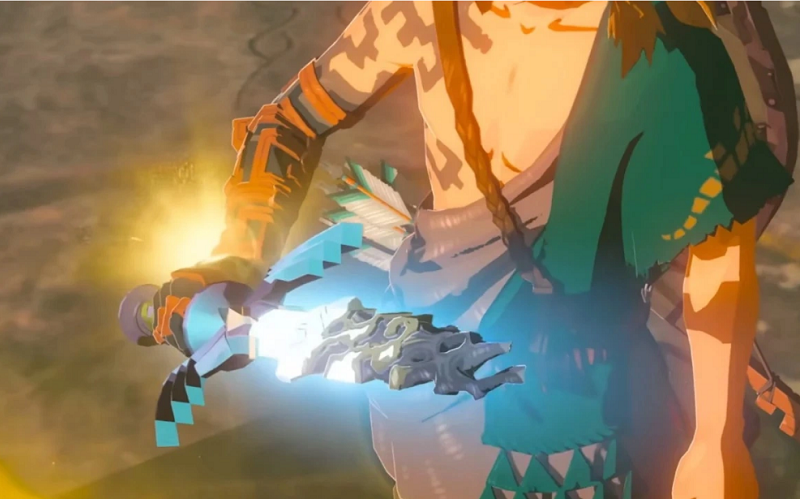How can something so beautiful and brilliant be as frustrating as The Legend of Zelda: Tears of the Kingdom? The reason lies in its intricate mechanical philosophy of play, something that has the perfection of form of a cat stalking its prey and the hair-pulling irritation of trying to give that same cat a pill.
Let’s start with the elephant in the room: weapon degradation. Nintendo doubled down on its most maligned mechanic from Breath of the Wild by shoring it up with a fairly inventive crafting system. Building weapons from enemy drops and random junk is not a bad idea. It’s not as functional as, say, The Surge, but it does at least give some weight and meaning to random encounters and exploration.
There’s no arguing that the weapon degradation system perfectly reflects both the latest game and the series as a whole. Hyrule has always been a land of trauma and brokenness. Fully half of the games are at least somewhat post-apocalyptic. The enduring mythos of Zelda is one where corruption has eaten the world. Hyrule rots. Tears of the Kingdom just takes the idea a bit more seriously from a gameplay perspective.
However brilliantly it aligns with the narrative, it’s still like standing on quicksand. All of the clever combinations of weapon fusing feel meaningless when those weapons shatter in the middle of fights. While it matches the message of the game’s narrative, the regular loss of everything the player builds is constantly disempowering. There’s a reason most video games only do that “you lose all your weapons” level once.
Playing Tears of the Kingdom is like being in a constant state of starvation. Every time Link needs to go through a cold part of the game, it’s a mad dash to get enough peppers to cook a meal that will protect you. If you mess any of that up there’s a long wait for the necessary items to respawn. Meanwhile, the game will keep bringing you back with full health but no protection. You then stumble through frozen wastes, dying a little at a time until the game over screen hits and you can try for a few more feet again.
There’s nothing wrong with a game making you win by inches. Elden Ring does this brilliantly, but it has a far less daunting mechanical approach. Instead of locking you in a tutorial area for seven hours, Elden Ring makes the majority of the map available without fighting a single boss provided you’re willing to poke around the edges.
Tears of the Kingdom seems almost like it hates the act of exploration. Huge segments get randomly walled off by weather, and running around the map can easily cost you rare resources that can take hours to recover. Basic traversal is treated almost like a mini-boss, and it is always happening.
I’ve heard Tears of the Kingdom described as ADHD: The Game, but I found it more like Executive Dysfunction: The Game. The bag of tricks that Link has this go-round is so vast, and the paths forward so obtuse, that I was never sure if I was unprepared or just too stupid to make it past the section. Most games that want you to return to areas later give you clear indicators, like enemy health bars or clearly marked obstacles that need an item. Tears is more subtle, but not in a helpful way.
This wouldn’t be a problem if Tears was an RPG with a leveling system. Then, those inches gained could at least be permanent growth. Instead, it’s a collection of temporary food-based stat buffs, falling stamina, and janky weapons that make progress feel like an illusion.
And hey, that’s perfect for The Legend of Zelda. The esoteric lore of the series is all about how evil is a never-ending cycle that can only be reset, never stopped. On a long enough timeline, even the Master Sword breaks. Tears of the Kingdom looked at what Zelda said narratively over the last three decades and translated it directly into every inch of the gameplay. For being its most Zelda self, the game cannot be faulted.
But I found it exhausting.
Support Us
Houston's independent source of
local news and culture
account
- Welcome,
Insider - Login
- My Account
- My Newsletters
- Contribute
- Contact Us
The Mechanical Philosophy of Tears of the Kingdom is Very Frustrating

Screenshot from Legend of Zelda: Tears of the Kingdom
Even Link bloody falls apart in this game.
[
{
"name": "Related Stories / Support Us Combo",
"component": "11591218",
"insertPoint": "4",
"requiredCountToDisplay": "4"
},{
"name": "Air - Billboard - Inline Content",
"component": "11591214",
"insertPoint": "2/3",
"requiredCountToDisplay": "7"
},{
"name": "R1 - Beta - Mobile Only",
"component": "12287027",
"insertPoint": "8",
"requiredCountToDisplay": "8"
},{
"name": "Air - MediumRectangle - Inline Content - Mobile Display Size 2",
"component": "11591215",
"insertPoint": "12",
"requiredCountToDisplay": "12"
},{
"name": "Air - MediumRectangle - Inline Content - Mobile Display Size 2",
"component": "11591215",
"insertPoint": "4th",
"startingPoint": "16",
"requiredCountToDisplay": "12"
}
]

